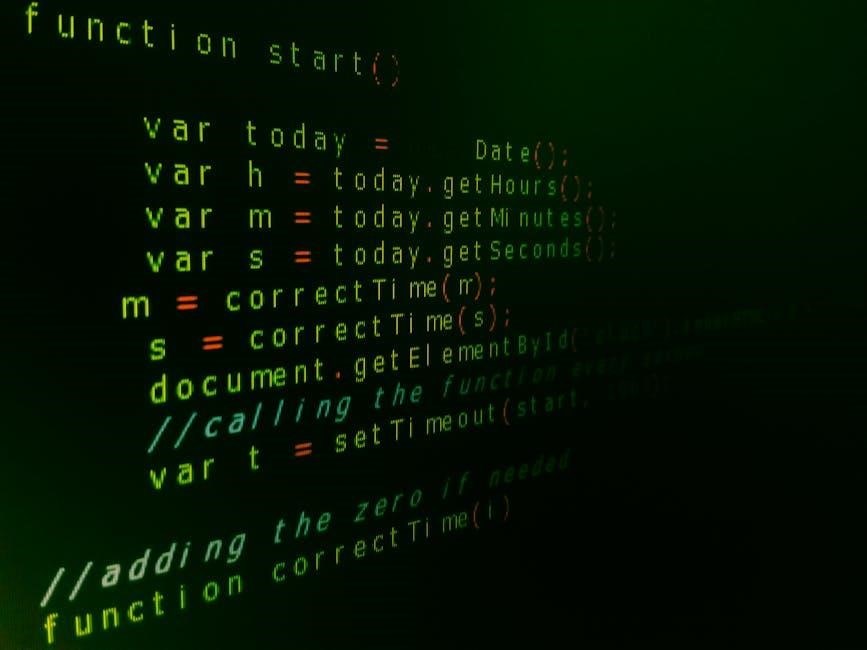
mock code scenarios pdf
Mock code scenarios are simulated situations designed to mimic real-world challenges, enabling individuals to practice and refine their skills in a controlled environment․ These scenarios are crucial for enhancing preparedness and improving coding accuracy across various fields, including software development and medical training․
1․1 Definition and Purpose of Mock Code Scenarios
Mock code scenarios are structured, simulated situations designed to replicate real-world challenges, allowing individuals to practice and refine their coding skills in a controlled environment․ Their primary purpose is to enhance preparedness, improve accuracy, and ensure compliance with coding standards․ These scenarios are widely used in software development, medical coding, and training programs to test systems, train professionals, and identify potential issues․ By mimicking actual coding challenges, mock scenarios help bridge the gap between theory and practice, ensuring that coders can apply their knowledge effectively in real-world situations․ This approach is essential for maintaining high standards and reducing errors in critical fields․
1․2 Importance of Mock Code Scenarios in Modern Applications
Mock code scenarios play a vital role in modern applications by improving accuracy, reducing errors, and ensuring compliance with industry standards․ They enable professionals to practice coding techniques, test systems, and identify potential weaknesses in a risk-free environment․ In fields like software development and medical coding, these scenarios are essential for training and maintaining high standards․ By simulating real-world challenges, mock scenarios help professionals prepare for complex situations, ensuring they can respond effectively․ This approach not only enhances individual skills but also contributes to the overall quality and reliability of coding practices across various industries․

Understanding Mock Code Scenarios
Mock code scenarios simulate real-world challenges, allowing individuals to practice coding techniques and test systems in a controlled environment․ They enhance preparedness and improve coding accuracy effectively․
2․1 What Are Mock Code Scenarios?
Mock code scenarios are structured, simulated exercises designed to replicate real-world coding challenges․ They provide a controlled environment where individuals can practice, test, and refine their coding skills․ These scenarios often involve specific tasks or problems that mirror actual coding situations, allowing for hands-on experience without real-world consequences․ By using mock scenarios, developers and coders can identify weaknesses, improve efficiency, and adapt to new technologies․ They are widely used in education, training, and professional development to enhance coding proficiency and preparedness for diverse applications․
2․2 Key Features and Benefits
Mock code scenarios offer realistic simulations of coding challenges, enabling hands-on practice in a risk-free environment․ They provide detailed feedback, helping to identify and correct errors․ These scenarios are adaptable to various skill levels and coding languages, ensuring relevance for both beginners and experienced professionals․ By replicating real-world problems, they enhance problem-solving skills and improve coding efficiency․ Collaboration features allow developers to work together, fostering teamwork and communication․ Additionally, mock scenarios save time and resources by enabling testing of ideas before implementation․ Overall, they are a versatile and effective tool for skill development and refinement in coding․

Applications of Mock Code Scenarios
Mock code scenarios are widely applied in software development, medical training, and emergency preparedness․ They simulate real-world challenges, enhancing coding accuracy and decision-making skills across diverse fields effectively․
3․1 Role in Software Development and Testing
Mock code scenarios play a vital role in software development by simulating real-world challenges, allowing developers to test and refine their codes in a controlled environment․ These scenarios help identify potential bugs, improve system reliability, and ensure compliance with best practices․ By mimicking actual user interactions and edge cases, mock scenarios enable developers to anticipate and address issues before deployment․ This approach enhances overall software quality, reduces post-launch errors, and streamlines the debugging process, making it an essential tool in modern software development and testing workflows․
3․2 Use in Medical Coding and Training
Mock code scenarios are widely used in medical coding and training to simulate real-world patient cases, enabling coders to practice and refine their skills․ These scenarios often involve assigning accurate ICD-CM and CPT codes to diagnoses and procedures, ensuring compliance with coding guidelines․ They are particularly valuable for training new coders, as they provide hands-on experience with complex cases․ Additionally, mock scenarios help healthcare professionals prepare for audits and improve coding accuracy․ This approach ensures that coders are well-equipped to handle diverse medical situations, enhancing overall coding quality and consistency in healthcare settings․

Best Practices for Using Mock Code Scenarios
Effective mock code scenarios require clear objectives, realistic simulations, and feedback mechanisms․ Regular practice and iterative improvement enhance skill development and practical application in various fields․
4․1 Designing Effective Scenarios
Designing effective mock code scenarios involves aligning objectives with real-world challenges․ Scenarios should be realistic, incorporating diverse situations to simulate practical coding problems․ Clear instructions and measurable outcomes are essential, ensuring participants can assess their performance․ Feedback mechanisms, such as automated checks or expert reviews, enhance learning․ Iterative refinement based on user feedback improves scenario relevance and effectiveness․ Utilizing tools like LabVIEW for simulation and AI for dynamic responses can elevate scenario design․ Structured templates and guides, as seen in medical coding systems, provide frameworks for consistent and high-quality scenario development across various applications․
4․2 Implementing Scenarios in Real-World Settings
Implementing mock code scenarios in real-world settings requires careful integration into existing workflows․ These scenarios are widely used in training programs, software testing, and medical coding to simulate authentic challenges․ For instance, in medical training, scenarios mimic emergency situations, helping professionals refine their decision-making skills․ In software development, they test systems under controlled conditions, identifying potential failures․ Tools like LabVIEW enable realistic simulations, while AI enhances dynamic responses․ Feedback loops and post-scenario analyses are crucial for continuous improvement․ Customization to specific industries ensures relevance, making mock scenarios invaluable for practical skill enhancement and operational efficiency across diverse fields․

Tools and Resources for Mock Code Scenarios
Various tools like LabVIEW, simulation software, and specialized platforms facilitate the creation and execution of mock code scenarios․ PDF guides and templates are also widely available․
5․1 Software and Platforms for Generating Scenarios
Software tools like LabVIEW and specialized simulation platforms enable the creation of detailed mock code scenarios․ These platforms offer advanced features such as real-time data analysis, customizable templates, and scenario modeling․ They are widely used in fields like software development and medical training to simulate real-world challenges․ Platforms also provide collaborative environments, allowing teams to design and test scenarios together․ Additionally, many tools integrate with AI and machine learning, enhancing scenario complexity and adaptability․ These resources are complemented by downloadable PDF guides, ensuring users can maximize their effectiveness in generating and implementing mock code scenarios for diverse applications․
5․2 Recommended PDF Guides and Templates
Several PDF guides and templates are available to aid in creating and utilizing mock code scenarios effectively․ These resources often include step-by-step instructions, sample scenarios, and best practices for designing realistic and engaging simulations․ For medical coding, guides like those referencing ICD-CM and CPT codes provide structured frameworks for training․ Similarly, software development templates offer pre-designed scenarios for testing and debugging․ Authors like KA Shishin and others have published detailed PDF materials on automated testing and scenario generation․ These guides are invaluable for both educators and professionals, ensuring mock code scenarios are implemented efficiently and effectively across various industries․

Case Studies and Examples
Real-world applications of mock code scenarios include medical coding simulations and software testing․ For instance, a fire scenario in a building tested emergency response systems effectively․
6․1 Successful Implementation in Various Fields
Mock code scenarios have been successfully applied in diverse sectors․ In medical training, simulations mimic real patient emergencies, enhancing coding accuracy and response times․ Similarly, in software development, these scenarios test system robustness, identifying vulnerabilities before deployment; For instance, a study detailed a fire simulation in a building, demonstrating how mock scenarios improve emergency preparedness․ Another example includes their use in arbitration, where mock trials help identify corruption risks․ These implementations highlight the versatility and effectiveness of mock code scenarios in addressing complex challenges across industries․
6․2 Lessons Learned from Real-World Applications
Real-world applications of mock code scenarios have revealed valuable insights․ In medical coding, simulations highlighted the importance of accurate ICD-CM and CPT code assignments for billing and patient care․ In software development, automated unit tests using Spring framework demonstrated the need for early vulnerability detection․ Overcurrent relay modeling in LabVIEW showed how simulations can validate complex systems before deployment․ These lessons emphasize the importance of refining processes, reducing errors, and enhancing adaptability․ Such applications underscore the critical role of mock scenarios in improving outcomes and fostering collaboration across disciplines․

Future Trends and Innovations
Future trends include integrating AI and machine learning to generate dynamic mock scenarios, enhancing realism and adaptability․ Advances in scenario generation will improve accuracy and efficiency․
7․1 Integration with AI and Machine Learning
The integration of AI and machine learning into mock code scenarios promises significant advancements․ These technologies can analyze real-world data to create dynamic, adaptive scenarios that mimic actual challenges more accurately․ AI-driven tools can predict user actions, offering real-time feedback and improving training efficiency․ Machine learning algorithms can also personalize scenarios based on individual skill levels and roles, ensuring tailored learning experiences․ Additionally, AI can automate the generation of complex test cases, reducing manual effort and enhancing scalability․ This integration is expected to revolutionize how mock scenarios are developed and utilized across industries, making them more effective and realistic than ever before․
7․2 Advancements in Scenario Generation Techniques
Advancements in scenario generation techniques have significantly enhanced the realism and effectiveness of mock code scenarios․ Automated tools now streamline the creation of complex, data-driven scenarios, reducing manual effort․ Modern techniques leverage data analytics and AI to craft scenarios that reflect real-world challenges accurately․ Customizable templates and cloud-based platforms enable rapid scenario development tailored to specific roles or industries․ These innovations allow for dynamic, adaptive scenarios that evolve based on user interactions, providing more immersive training experiences․ Such advancements ensure mock code scenarios remain relevant and effective in addressing diverse training needs across various fields․